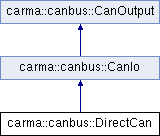The DirectCan class is intended for use as a way to access the CANbus from multiple separate processes in conjunction with a process implementing the DO model. More...
#include <carma/canbus/DirectCan.h>

Public Member Functions | |
| DirectCan () | |
| Constructor. More... | |
| Message | getMessage () |
| Get a message from the CAN Message IPQ. More... | |
| Message | getMessage (idType id) |
| Get a specific message from the CAN Message IPQ. More... | |
| void | postMessage (const carma::canbus::Message &msg, carma::canbus::txPriorityType prio=carma::canbus::NORMAL) |
| Post a message to the CAN bus. More... | |
| ~DirectCan () | |
| Destructor. More... | |
 Public Member Functions inherited from carma::canbus::CanIo Public Member Functions inherited from carma::canbus::CanIo | |
| virtual void | clearReadQueue () |
| Clear any underlying read buffers. More... | |
| virtual void | echoAll (bool enable) |
| Enable or disable echoing sent messages back through the read interface. More... | |
| virtual BusStatusMap | getBusStatus () const |
| Retrieve bus statistics. More... | |
| virtual void | queueMessage (const Message &msg) |
| Queue CAN message to be read for simulation purposes. More... | |
| virtual void | setTimestampEchoLatency (int tsLatency, busIdType busId) |
| Set timestamp echo latency. More... | |
| virtual | ~CanIo () |
| Virtual destructor. More... | |
Detailed Description
The DirectCan class is intended for use as a way to access the CANbus from multiple separate processes in conjunction with a process implementing the DO model.
It makes use of shared memory queues of CAN messages to get and post messages to the CAN bus. It is required that a CAN host process be running on the CANbus(ses) requiring direct CAN access. This is due to the fact that DirectCAN was designed to concurrently run with the DO model. If no DOs exist on the system in question then the user may be better off directly accessing the CAN bus with the CanIo or CanDio classes. May it be noted that this class may be extremely useful for debugging DOs.
Since CAN is a finite bandwidth bus and DirectCan depends on shared memory and a CAN Master (carma::canbus::Master) process to access the CAN bus, read and write buffer overflow errors are possible. These errors will not always be detectable from DirectCan directly. The getMessage routines will throw a carma::canbus::BufferOverflowException when overflows occur. However, the situation for posting messages to the CAN bus is more difficult. Please see DirectCan::postMessage for a detailed explanation of how write overflow errors can be detected.
BusId: It is important that the user of this class understand how BusIds are used in the system. Since multiple CAN Masters each controlling multiple CAN busses but all requiring Direct CAN access may be running on any given target host, it was necessary to devise a system assuring unique busIds. This was accomplished by parsing the input device name (i.e. /dev/dpm_00) into a busId. As a result, it is not directly obvious which busId a DirectCan user will need to access (what is the BusId of the device you are controlling). Thus in general a user will need to determine the busId of the device he or she is controlling by calling msg.getBusId() from a msg known to come from his/her device. The blanket busId carma::canbus::ALL_BUSSES is provided to allow a DirectCan user to send to all busses and this may be used initially to assure communication with your device until the BusId is retrieved.
Definition at line 65 of file DirectCan.h.
Constructor & Destructor Documentation
| carma::canbus::DirectCan::DirectCan | ( | ) |
Constructor.
- Exceptions
-
carma::util::ErrorException on failure to open shared memory required for DirectCan. This exception generally signals that a CanMaster host process is not running on the system, or that you are running a DirectCan application with less priveledge than the CanMaster process.
| carma::canbus::DirectCan::~DirectCan | ( | ) |
Destructor.
Member Function Documentation
|
virtual |
Get a message from the CAN Message IPQ.
Blocks until next message is retrieved from CAN bus. This routine will throw an exception if it trys to retrieve a message that has been overwritten by the writer. In this case, the user is not reading from the interprocess queues quickly enough and messages are being lost.
- Exceptions
-
carma::canbus::BufferOverflowException if messages were lost since the last getMessage call.
Implements carma::canbus::CanIo.
Get a specific message from the CAN Message IPQ.
Blocks until next message with a matching id is retrieved from the CAN bus. Note that if the message is never received, this will block forever. Also note that any messages received between the time we call getMessage and the time when the desired message is received will be lost to this object!
- Parameters
-
id Full 29 bit CAN id to await.
- Exceptions
-
carma::canbus::BufferOverflowException if messages were lost since the last getMessage call.
- See Also
- carma::canbus::getMessage
|
virtual |
Post a message to the CAN bus.
Unfortunately, there is no direct way to indicate a write buffer overflow error (write overflows) from DirectCan. This is due to the design of the IPQ classes and would require a major overhaul of these classes. Buffer overflows can be and are detected within the CAN Master process however. When they are detected, the message is dropped, the error is logged and execution will continue as normal. If a user of this routine suspects write overflows are occurring, he should first check that the CAN Master process is running and then monitor the syslog for carma::canbus::TxBufferFullException and carma::canbus::BufferOverflowException messages reported from the CAN Master.
- Parameters
-
msg to CAN bus.
Implements carma::canbus::CanOutput.
The documentation for this class was generated from the following file:
- carma/canbus/DirectCan.h
